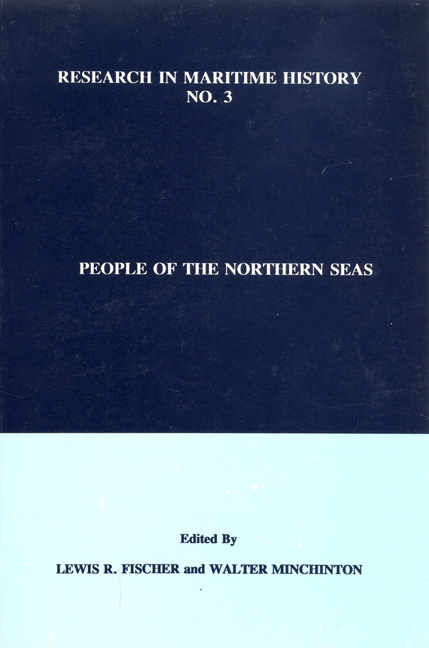Book contents
- Frontmatter
- Contents
- About the Editors
- Contributors
- General Introduction
- “Une Petite Republique” in Southwestern Newfoundland: The Limits of Imperial Authority in a Remote Maritime Environment”
- “Changes in Aleut Communities Following Russian Contact”
- “Five Years Before the Mast: Observations on the Conditions of Maritime Labour in Finland and Elsewhere”
- “Expressions of Longing, Sources of Anxiety? The Significance of Contacts with Home for Finnish Sailors in London and Hull in the Late Nineteenth Century”
- “Death of a Merchant”
- “St. Petersburg's Bills of Exchange in the Russian Economy of the Eighteenth Century”
- “Shipowners and Iron Sailing Ships: The First Twenty Years, 1838-1857”
- “The Growth of Norwegian Shipbroking: The Practices of Fearnley and Eger as a Case Study, 1869-1914”
- “Captain John Deane: Mercenary, Diplomat and Spy”
- “Her Majesty's Coastguard”
- “Coastal Life, ‘Nordic Culture’ and Nation State: Reflections on the Formation of the Nation State and Maritime History”
“St. Petersburg's Bills of Exchange in the Russian Economy of the Eighteenth Century”
- Frontmatter
- Contents
- About the Editors
- Contributors
- General Introduction
- “Une Petite Republique” in Southwestern Newfoundland: The Limits of Imperial Authority in a Remote Maritime Environment”
- “Changes in Aleut Communities Following Russian Contact”
- “Five Years Before the Mast: Observations on the Conditions of Maritime Labour in Finland and Elsewhere”
- “Expressions of Longing, Sources of Anxiety? The Significance of Contacts with Home for Finnish Sailors in London and Hull in the Late Nineteenth Century”
- “Death of a Merchant”
- “St. Petersburg's Bills of Exchange in the Russian Economy of the Eighteenth Century”
- “Shipowners and Iron Sailing Ships: The First Twenty Years, 1838-1857”
- “The Growth of Norwegian Shipbroking: The Practices of Fearnley and Eger as a Case Study, 1869-1914”
- “Captain John Deane: Mercenary, Diplomat and Spy”
- “Her Majesty's Coastguard”
- “Coastal Life, ‘Nordic Culture’ and Nation State: Reflections on the Formation of the Nation State and Maritime History”
Summary
In April 1991, one of the first issues of the new Leningrad newspaper Stockowner contained a curious article entitled “Prospects for the Circulation of Promissory Notes in the USSR.” It proposed that an instrument entirely new to the Soviet Union's domestic economy, the negotiable note, be introduced to ease the settling of business accounts. For a handful of readers, this was not so much something new as a return to an instrument that had helped to animate Russia's commercial economy in the eighteenth century. The terminology employed to explain the function of the promissory note, as well as the organization of the explication, echoed similar explanations in eighteenth-century legislation and academic lectures designed to educate the commercial public about the benefits and advantages of using the promissory note.
As uninformed as contemporary Russians may be about the mechanics of the negotiable instrument in today's business world, historians of the eighteenth-century Russian economy are generally only slightly more knowledgeable about its role then. There is an explanation for our ignorance. It begins with a short discourse into economic history.
Background
Throughout the eighteenth century, the economy of the Russian Empire became more fully integrated, largely as a result of policies and technological improvements undertaken early in the century. For example, the canal projects begun under Emperor Peter I and expanded under subsequent monarchs were largely completed by mid-century, opening water access to the Baltic for wares produced or mined as far away as the western slopes of the Ural Mountains in the east and Persia in the south. Landlords began to become aware of the possibilities for profit represented by their estates, and printed works started to appear advising landowners on how to achieve more efficient production.
The men who formulated government policy sought to encourage growth, if only to facilitate the collection of more revenue and to permit Russia to become a more powerful state. It was not easy, however, to determine what that policy should be. Not only were there competing patronage networks in the government, frequently espousing contending views, but also there were larger social groupings at odds over the best way to enrich Russia, because they saw differing possibilities for themselves.
- Type
- Chapter
- Information
- People of the Northern Seas , pp. 99 - 114Publisher: Liverpool University PressPrint publication year: 1992



